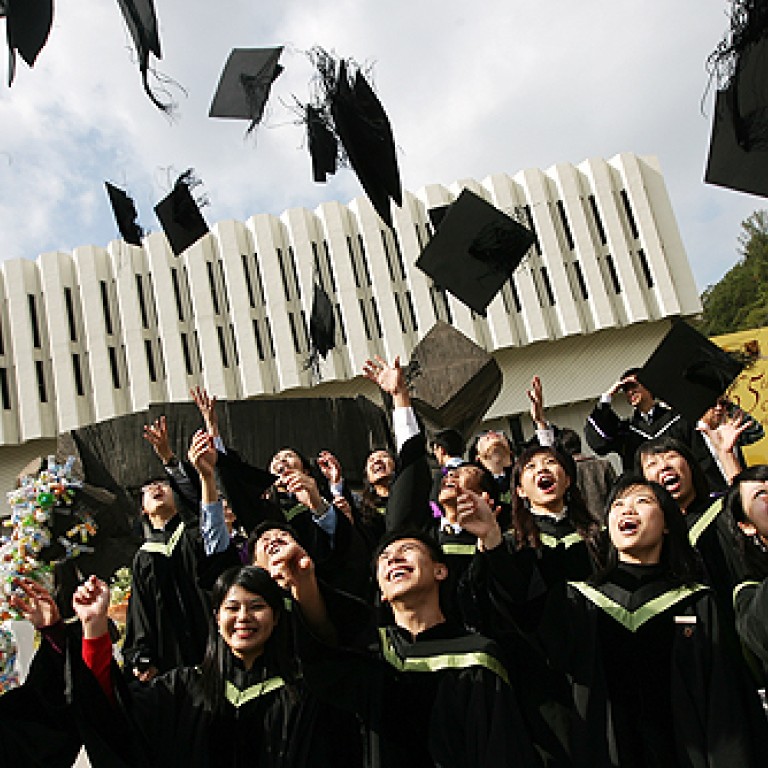
Are mainland Chinese students 'robbing Hong Kong locals of school places and jobs'?
Born and raised in Shanghai, I arrived in Hong Kong to study journalism about one year ago. I don’t consider myself a Hongkonger yet, but I feel I am no longer just Shanghainese or mainland Chinese. Hong Kong has left something in my life.
Resorting to xenophobia is counterproductive, and it makes losers out of all of us
Half an insider and half-outsider in this vibrant international city, I have come to understand why some local students feel concerned about people from the mainland studying here. Increasing competition for better marks at school and for limited jobs naturally makes people nervous. Some may become emotional.

Do mainland students “grab the enrolment quota” in graduate schools as the proposed advertisement says?
The truth is, we went through complicated application procedures and passed tough selection processes to end up in Hong Kong.
To be accepted into the master of international journalism programme, one must have a TOEFL (Test of English as a Foreign Language) score of higher than 92 out of 120, or an IELTS (The International English Language Testing System) score of more than 6.5 out of 9. On top of that, one also needs to pass a qualification test or an interview, or both, depending on the school. The standard will be higher next year because of a higher number of applicants from mainland China, according to my programme director.
However, I did hear about some mainland students coming here through unrighteous methods, such as faking transcripts and pulling , or family connections. But I believe Hong Kong’s universities are able to screen out most of the frauds and cheats, and the majority of mainland students come here by honest, hard work.
The accusation that mainland students hog local education resources doesn’t make sense either.
When it comes to graduate schools, there are two types – the two-year research track and the one-year taught track. The taught programme, the kind I am in, is not funded by the government. Enrolled students need to pay the total tuition, about HK$80,000 to HK$100,000 a year. Only a small number of scholarships are available to top students. The research programme is supported by the government, but students also need to pay about HK$40,000 a year and assist professors doing research.
Overall, more than 70 per cent of postgraduates in local universities are from the mainland. But this appears to be the result of mutual choice, not any unfair preference for mainland students. My understanding is, local employers value working experience more than they do consecutive degrees, so most local graduates tend not to spend up to HK$100,000 a year on graduate schools. Those who do also have the choice of going abroad for more diverse experience and better opportunities, just as Hong Kong is one of the options for mainland university graduates.
On the other hand, there aren’t too many international applicants for local graduate schools, such as from the Americas, Europe or other parts of Asia. That may explain why a large number of mainland students end up here.
What about mainland students’ impact on Hong Kong’s employment market?
Around half of mainland undergraduates find jobs in Hong Kong after graduation, along with about 30 per cent of mainland postgraduates. No doubt they add to the cutthroat competition of Hong Kong’s job market, but employers naturally want the best and brightest. It is not a zero-sum game: by employing top-notch people and excelling in global competition, Hong Kong could further consolidate its leadership in the global markets, in turn generating more jobs for locals and migrants alike.
I still remember how deeply I was moved by the anti-national education campaign when I first arrived here in September. People can protest legally here if they are discontent, so things might improve. Likewise, local youths and students have the legal right to raise money to buy advertisement to protest what they believe is the “mainlandisation” of Hong Kong. But freedom should not be abused, nor taken as an excuse to suppress the rights and freedom of others.
Freedom, openness, fair and equal opportunities are exactly what we love about Hong Kong. Those of us who manage to stay, emerging from tough competition against local and international talents, and adapting to Hong Kong’s unique language, culture and business environment, have proven our value and are ready to contribute to this great city. In this process, many make their homes here and become Hongkongers themselves.
I love my hometown and I also love Hong Kong, but I always treat myself as a world citizen. The world is a beautiful global village and I open up my heart to let it in. Tolerance and diversification make the world great.
Vicky Feng will soon graduate from the master of international journalism programme at Baptist University

